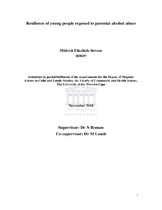Resilience of young people exposed to parental alcohol abuse
Abstract
This study explores the possible resilient factors which prevent young people who have been exposed to parental alcohol abuse from abusing alcohol themselves. Additionally, this study explores the coping mechanisms of young people living with a (n) alcohol abusing parent(s). This study uses a qualitative methodological design. The initial plan was purposive sampling. However it became evident that this type of sampling is not possible as no suitable candidates were found. One participant volunteered to participate in the study and suggested a few other suitable candidates. The candidates were contacted and invited to become part of the study. Individual interviews were conducted with the participants, using an interview guide and a voice recorder. The researcher ended up using snowball sampling as the candidates suggested other possible candidates. The findings suggest that the participants experienced an array of emotional, developmental and socio-economical difficulties. Feelings of shame, fear, anxiety and a deep sense of unhappiness about the situation was shared by all the participants. The family, friends and some teachers were instrumental in helping to find coping mechanisms during this challenging time of growing up with an alcohol abusing parent. Religion, academics, and positive role-modelling were contributing factors to their resilience in not using alcohol themselves even though they were exposed to alcohol-abusing parents.

